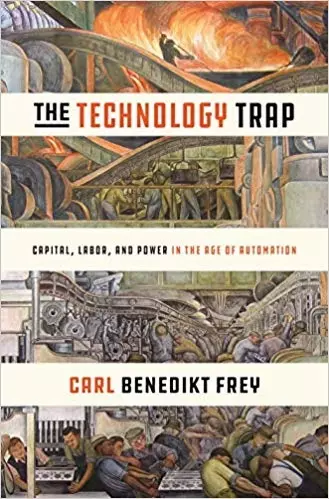The Technology Trap
Peter Sloman
Rich narrative needing more synthesis and policy recommendation
Carl Benedikt Frey delivers a rich, informative and engaging social and economic narrative history of technology. He documents the widespread often violent resistance to the early technologies of the Industrial Revolution by workers’ guilds, claiming that societies with strong monarchies exerted more effective resistance, thus delaying their industrialisation, and allowing UK to become the first industrial nation. Technology requires complementary structures for its implementation, which led to frequent long delays in extracting its utility.
Frey points to the effect of competition between cities and nations as the mechanism allowing technology to triumph into implementation. He may thereby be stating a case for the autonomy of technology in its human nexus, but he doesn’t engage with the literature on the philosophy of technology, ranging from Heidegger to Habermas, Ellul to Feenberg, which debates this and other crucial points. This loses analytical power.
Narrative style faces the challenge of the selective criteria applied to create the account. Frey regularly refers to a stream of academic papers, (nearly always authored by two economists!), and then makes assertions and ponders interpretations without rigorous empirical test. He doesn’t offer any overall explanatory hypothesis of technology for test. This leads to a lack of synthesis and focus. Frey’s implied conclusion is perhaps that technology is beneficial if society manages its more immediate adverse outcomes.
His review of potential actions is brief. In particular, he summarily dismisses basic income as a necessary resolution. Despite frequently quoting Robert Solow, Frey omits Solow’s insightful remark on basic income made in ‘Revisiting Keynes, Economic Possibilities for our Grandchildren, Lorenzo Pecchi and Gustavo Piga (MIT 2008, p92) where Solow points out that with burgeoning production from advanced technologies ‘the wage will absorb only a small fraction of all that output. The rest will be imputed to capital...the extreme case of this is the common scare about universal robots: labour is no longer needed at all. How will we then live? The ownership of capital will have to be democratised...(needing) some form of universal dividend...Not much thought has been given to this problem’.
Having described the hollowing out of the middle class and the prediction of his own joint paper that AI automation could threaten 47% of US jobs, he dismisses basic income because ‘there is little to suggest that widespread joblessness is imminent’ or ‘fears that work will disappear have always turned out to be false alarm’ (p356). This is inconsistent with his earlier argument, but also misses the point that it is not total employment which is necessarily threatened, but aggregate consumer income, whose demonstrable relative decline triggers excessive consumer debt to support expenditure, leading to consequent economic crisis. This is the economic technology trap to which a basic income funded by sovereign money is the unique and necessary solution.
Geoff Crocker
Editor ‘The Case for Universal Basic Income’
www.ubi.org

